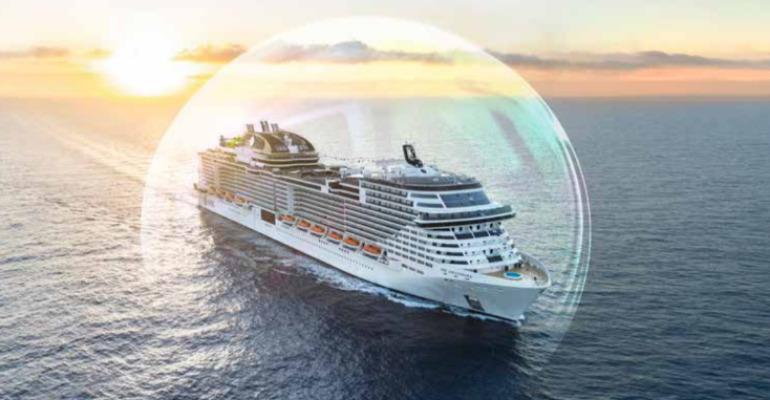‘During 2020 we achieved a huge amount and MSC Cruises rose to the challenges posed by the pandemic,’ declared Pierfrancesco Vago, executive chairman, MSC Cruises, ‘We got all our guests and crew home safely early on, and we were then the first to launch our industry leading health and safety operating protocol that has redefined cruising and made it one of the safest options for a holiday now and in the future.
‘During all this, we did not lose sight of our commitments to be an ethical as well as sustainable company.’
The number of commercially operational days dropped by 75% last year and the number of passengers carried decreased by 78%.
Repatriation
The report explains the repatriation of tens of thousands of passengers last March followed by crew members, and the warm layup of its fleet.
It outlines the services extended to crew to support their mental health, infrastructure introduced to enable remote working for shoreside employees, training, as well as the establishment of a global communication platform.
Health and safety measures
In partnership with a Blue Ribbon COVID-19 Expert Group of internationally renowned public health experts, the line resumed sailing on August 16 in the Mediterranean with new health measures in place, as explained in the report.
It goes on to outline the creation of the ‘bubble’ excursion concept.
Cutting emissions and investment in LNG-powered vessels
‘We made significant progress in protecting our planet by reducing emissions through investment in new technologies like LNG,’ continued Vago, ‘bringing us closer to achieving net carbon neutral operations by 2050, as well as other major accomplishments in looking after our people, caring for the places we visit, improving procurement and providing emergency support through the MSC Foundation.’
Vago’s explanation was supported by Linden Coppell, sustainability director, MSC Cruises who observed, ‘At present, our industry is almost wholly reliant on fossil fuels. To achieve our zero emissions goal, we will need to switch to new fuels and require the support of governments and regulators to enable this major transition in the cruise industry.’
She added, ‘In the meantime, we are committed to improving the energy efficiency of our existing fleet and are considering how best to prepare for the future. This includes investigating the use of low carbon fuels that, if available at scale, can replace existing fuels without significant modification of current machineries and systems.’
The line forecasts that it remains on track to meet or exceed the target for 40% improvement in emissions intensity by 2030 compared to 2008: acknowledging ‘true comparisons in 2020 compared to previous years are not possible with the long layups,’ the report states, ‘a 2.5% improvement was seen prior to lay up in 2020 compared to the previous year, which would bring efficiency improvements since 2008 to over 30%.’
Due to enter service in 2022, work on the line’s first LNG-powered ship MSC World Europa accelerated in the past year, with two additional LNG vessels set to enter service in 2023 and 2025.
Sustainability projects
At the end of 2020, the EU Horizon 2020 fund gave support to the CHEK Consortium that aims to promote low-carbon maritime operations with research in to new energy technologies and ship design.
Ecorizon, an innovative process of ship energy optimisation that collects data using on board automation systems and sensors, was utilised on board MSC Grandiosa last year too allowing a precise status report on the ship’s energy profile. The information collected is used to guide onboard operators, improve operational profiles and voyage management.
‘This report recognises the immediate challenges that COVID-19 brought to us, and despite this, our continued focus on our environmental and social obligations and actions, not least the growing demand for decarbonisation,’ concluded Coppell.
According to the report, the line continues to work collaboratively on further reducing the use of plastic use, cutting waste and minimising impact on marine life and biodiversity.
Copyright © 2024. All rights reserved. Seatrade, a trading name of Informa Markets (UK) Limited.
Add Seatrade Cruise News to your Google News feed.  |

